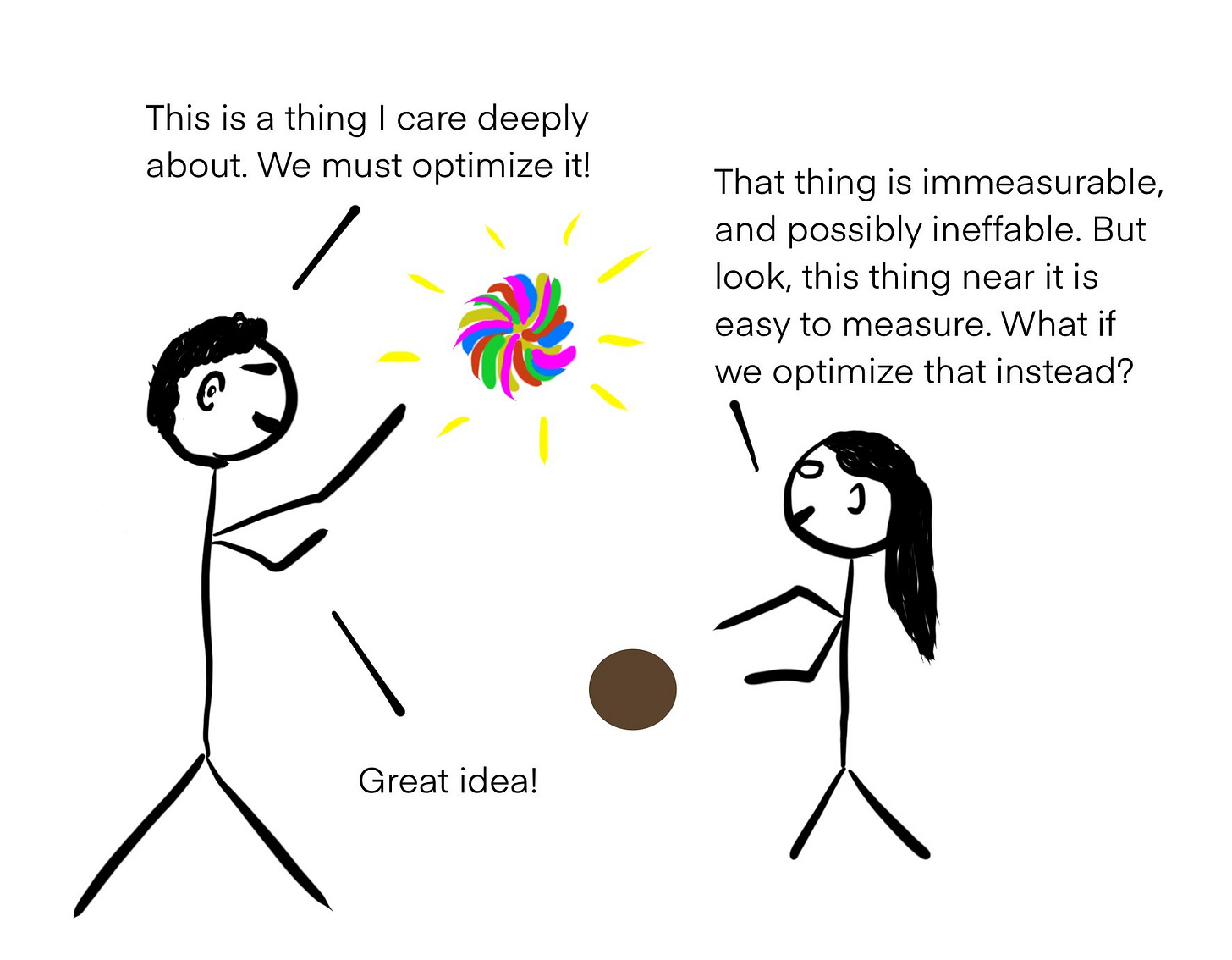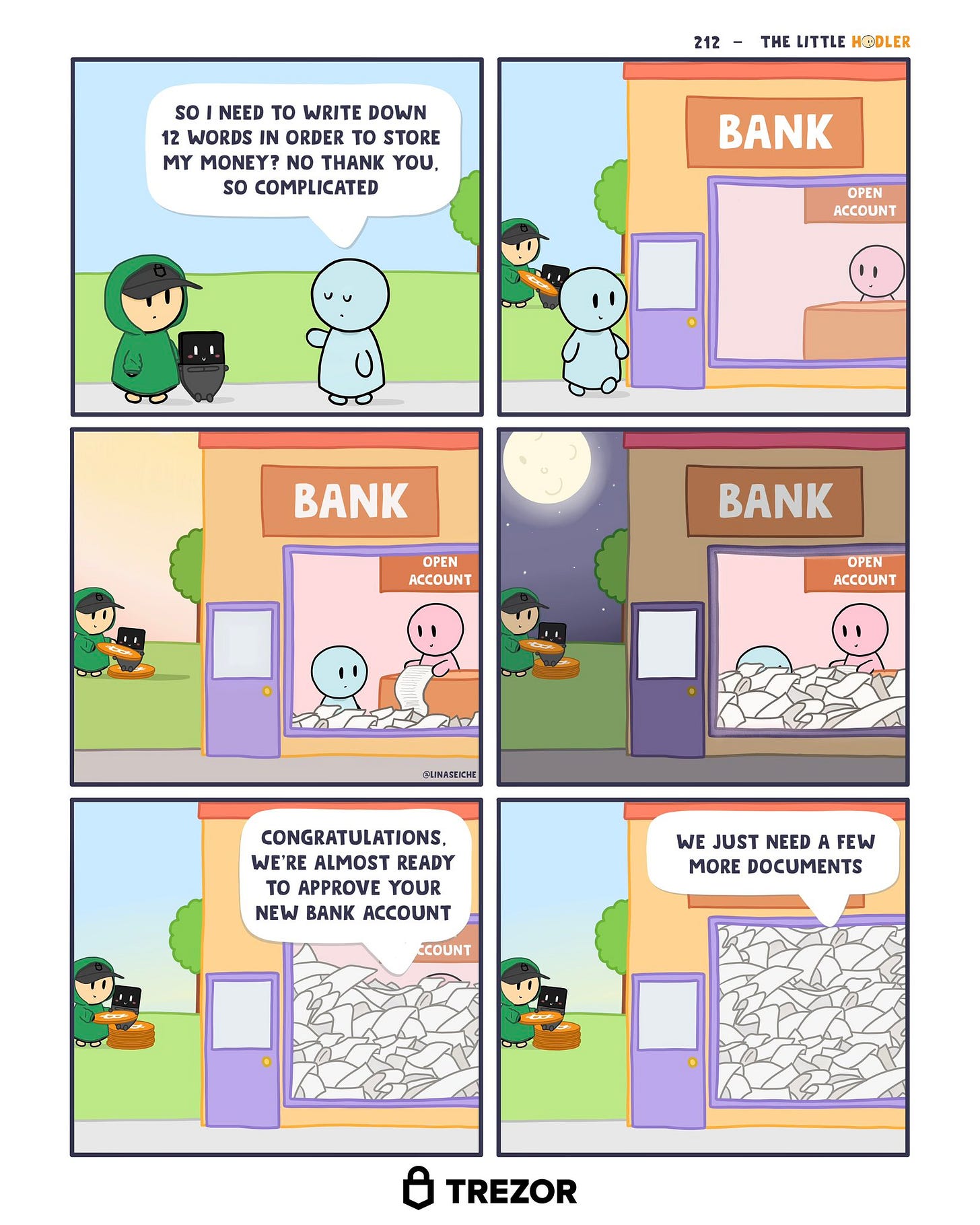Bitcoin Tech Talk #371
Interesting Stuff
Goodhart’s Law and Stupid Games - This is an amazing long-read on a common pitfall of anything that scales past Dunbar’s Number. That is, Goodhart’s Law, which states that any metric that gets measured and incentivized soon becomes a useless measure. The article starts with the US News College rankings and how they’ve been mercilessly gamed by university presidents to rank their institutions higher, but the real insight was that people use these dumb metrics to fool themselves. Metrics end up being stand-ins for values and sadly, they end with unsatisfactory outcomes, even if you win some stupid prizes.
No Longer Woke - A progressive goes through all the reasons why she thinks the woke crowd has gone too far. She identifies a smugness and arrogance of woke progressives (for example, their ignoring of the dangers of transitioning young children) as something that’s turning off a lot of people and how it’s setting them up for losing. While it’s good to see someone starting to explore the truth, the thing she keeps missing is that most of the ills she ascribes to the attitudes of progressives, is really the result of unbridled fiat monetary expansion. You can afford to ignore the populace when you steal their savings to gaslight them.
Modern Art is a PsyOp - Fascinating story of how the CIA was a major funder and promoter of Abstract Expressionism, the kind of art that you see from Jackson Pollack. Why would the CIA get involved in something seemingly so irrelevant to national security? As you can read from the article, they wanted to counter the USSR’s accusation that the US was culturally bereft. As you might expect the money that poured in as a result of their psyop corrupted the art world and continues to today.
What I'm up to
Navigating Health Care - I talked to Andy Schoonover of CrowdHealth and Veronica Max of UltraPersonal about how we should approach health care. The main message was that we should rely less on the system and take more responsibility with more prevention than reacting to bad outcomes. We also talked about health insurance, drug companies and food, all of which affect our health care.
PGP and Cypherpunks - My talk with Adam Back, Phil Zimmerman and Paolo Arduino is up. We talked about PGP, the lessons of email and government oppression among other things. There was also a ceremony at the end to honor the original cypherpunks, particularly, Assange, Zimmerman and Back in this Lugano Plan B Forum panel.
El Salvador - My talk with Max and Stacy from Lugano Plan B Forum is up. Having spent the week here, it’s pretty obvious what they are saying is true. The unleashing of development here is really astounding. Roads are getting paved, buildings are being built, and most importantly, people here have a lot of hope for the future. I suspect that hope is an underestimated feature of prosperity.
Nostr Note of the Week
What I’m Promoting
Unchained Capital is a sponsor of this newsletter. I am an advisor and proud to be a part of a company that’s enhancing security for Bitcoin holders. If you need multisig, collaborative custody or bitcoin native financial services, learn more here.
Bitcoin
STARK proof for BitVM - This paper lays out a way to create a proof of correct execution possible using BitVM, making the redemption process for BitVM-locked funds a lot easier. Instead of the challenge-response of many different parts, this can be a single challenge response, making the process simpler. The cost is that there have to be more computations off-line, but the on-chain footprint will be a lot easier and simpler.
Understanding Shamir - Shamir’s Secret Sharing is a woefully underutilized technique for Bitcoiners and this is a great explanation of how it works. The main idea is that a polynomial of degree n-1 is unique if it has to pass through n different points. This is the LaGrange Interpolation Theorem and the basis for how you can distribute a secret into arbitrary pieces and allow people to reconstruct the secret if there is a quorum. To my knowledge the only things that use this technique are SLIP-39 and FROST.
Peer Memory - It looks like relaying transactions adds significantly to the memory requirements of nodes as seen in this post. Generally, peers relaying only blocks are a lot easier to handle from a RAM perspective than one that also relays other stuff (like transactions and filters). That said, take this with a grain of salt as the test was done in a very high fee environment and a very large mempool of transactions. I love this type of analysis as it gives us better ways to minimize the requirements of running full nodes or knowing how to trade off certain features. For example, I suspect that a node peering with blocks-only-relay nodes would be able to operate with much less memory.
Lightning
cipherchat - This is an app to do private messaging over the lightning network. In a sense, this feels a bit late since Nostr has more or less become a similar product. What’s interesting about this one is that it requires running of what we would call a relay in Nostr. This may mean that they has fewer dependencies and may result in better uptime and archives and so on. As we find that most big tech companies have wide open back doors for government surveillance, every one of these becomes another tool against tyranny.
Bitcoinize - This is a PoS system with printouts and so on to make Bitcoin and lightning payments much easier. This was developed by the people from Brazil’s Bitcoin Beach and the idea is to create a circular economy. The physical PoS device is nice because you don’t have to get your phone out for doing the transaction. I like that there are lots of PoS systems in this space and the integration with Lightning for most of them is heartening to see. May the best ideas spread.
Headaches of Force-Closes - In high fee-rate environments like we’re seeing recently, there can be some big headaches on force-closed channels. The article here goes into how you increase fees using CPFP and what to do when your transaction gets purged from the pool. Mainly, you’ll want to bump the fee on the child transaction and wait for the transaction to get in. It’s a pretty gnarly situation, particularly for routing node operators, and learning the mechanics of this process is a must.
Economics, Engineering, Etc.
CBDC Tracker - HRF has launched a CBDC tracker where you can see which countries are at what stage with regard to CBDCs. They rightly see CBDCs as a gigantic violation of privacy and seeing where countries are in the process is not a bad proxy for the level of financial authoritarianism. The places most progress towards a CBDC are probably also places where Bitcoin will become popular.
New Stagflation - Peter St. Onge says to expect some really unpalatable medicine in the coming years. Either we’ll get really high rates, which will devastate the government budget, or we’ll get really low rates, which will make inflation truly terrible. The unemployment and inflation together seem to be inevitable at this point and the economic outlook continues to look grimmer. Thank God for Bitcoin!
CPI Games - Marty points out the games they played to keep the CPI numbers low, including the assertion that health care costs have gone down 34%! This led to a CPI print of 3.2% which sounds almost normal, but of course, health care has certainly not gone down that much. I don’t know about you, but I didn’t see hospitals and doctors offices suddenly fire a third of the people, or get some new machine that made their practices a third more efficient. As you might expect, the authorities have a propensity to lie when things are getting worse.
Quick Hits
Signal is Expensive - Yes, it’s free, but it costs $50M/yr to run.
Open Source Funding - It’s not just Bitcoin, but other open source projects have a funding problem.
Pentagon fails audit - What’s a few trillion dollars, anyway?
Bath House powered by Miners - There’s always use for excess heat somewhere, I suppose.
UN of Crypto Taxes - Some nations want to collect more taxes from those skirting them through crypto.
Fiat delenda est.








